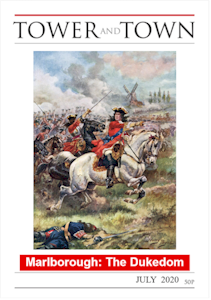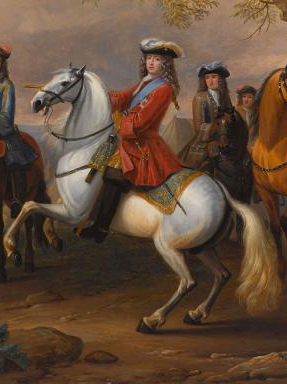

Tower and Town, July 2020 (view the full edition) (view the full edition)The War Of The Spanish SuccessionThe 17th century saw France as beyond question the dominant power in Europe. The wars of religion had come to an end in the previous century. It was rich and populous, creative - the Canal du Midi was built in mid-century linking Bordeaux on the Atlantic coast with the Mediterranean - and militarily dominant, taking Alsace and Lorraine to essentially achieve its present borders. It was the time of the three musketeers, a very capable field army, and the military engineer Vauban who had the reputation of capturing anywhere he besieged and making impregnable anywhere he fortified. It was also the time of Louis XIV - le Roi Soleil, the Sun King - who built much of what we see at Versailles, hankered after la gloire and reigned from 1643 (with a regent) to 1715. In 1700 King Charles II of Spain died childless and the two strongest candidates as his heir were his grandnephew Philip who was a (French) Bourbon and the grandson of Louis XIV, and Charles, an (Austrian) Hapsburg and the younger son of Leopold the Holy Roman Emperor (of effectively the Austrian Empire with territory in Italy as well as Germany, Hungary and Bohemia). Spain then also possessed territory in the Italian peninsular and in the Spanish Netherlands, so both of these were scary propositions for the balance of power in Europe. But of the two the Bourbon was much the worse, so the Grand Alliance was formed between Austria, the Dutch Republic, Savoy and Britain to stop this happening. Spain, where Philip was popular, allied itself with France, as did Bavaria.  Crucial to our story, the French and Bavarians threatened Vienna, so John Churchill marched an Anglo-Dutch army up the Rhine (rivers were essential for logistics) to support the Austrian Hapsburgs. He (and Prince Eugene of Austria) won a stunning victory at Blenheim in 1704; by 1706 the French armies were back within their borders but the war continued. In 1711 Emperor Leopold died and Charles unexpectedly succeeded him as Holy Roman Emperor; the prospect of him also becoming King of Spain was even more scary than Philippe, so there followed the Treaty of Utrecht in 1713. Under this Philippe was confirmed as King of Spain but renounced for himself and his descendants any claim to the French throne. Spain also lost all claims on territory in Italy or the Netherlands. The war can be seen to mark the emergence of Britain as a consequential military power on the European continent, active in maintaining the balance of power. Alexander Kirk-Wilson |